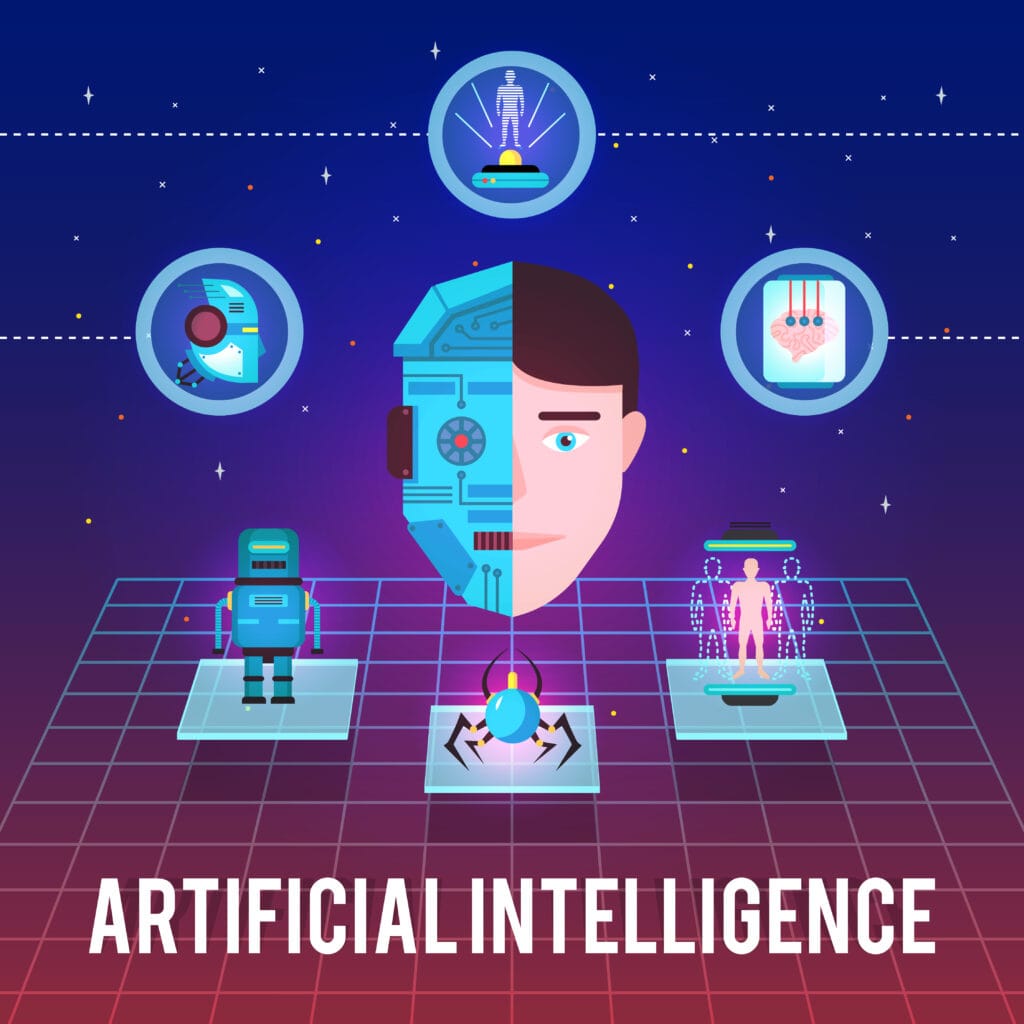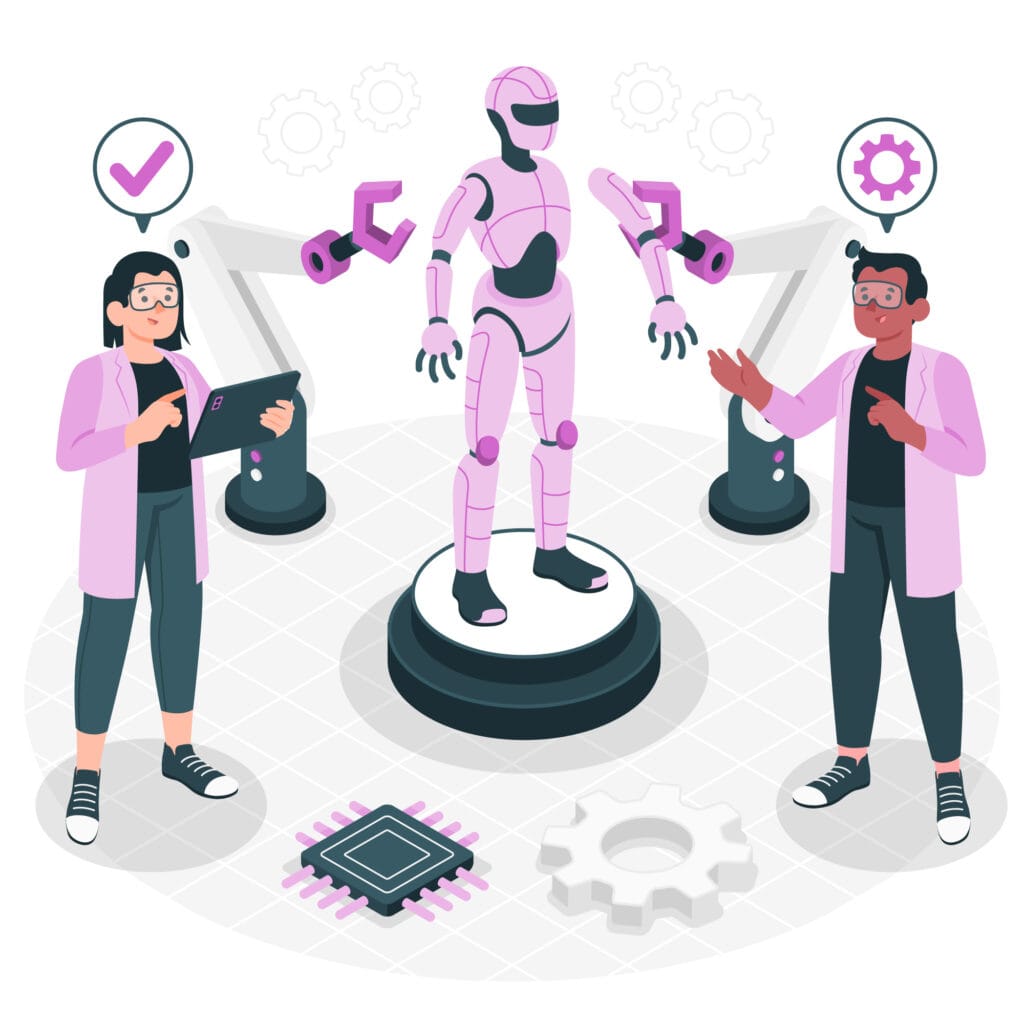Unveiling the Future: Exploring the Advancements in Artificial Intelligence
Advancements in Artificial intelligence (AI) have become quite possibly the most famous subject in the area of innovation and development. With progressions happening at an unrivaled rate, it is currently a great opportunity to investigate the exhilarating prospects and expected impact of artificial intelligence on our future.
Introduction:

Artificial intelligence (AI) has turned into a well-known term lately, as mechanical headways have made a future that was once just found in sci-fi a reality. Advancements in Artificial intelligence are changing different parts of our lives, from independent vehicles to remote helpers. The most recent advancements in artificial intelligence innovation and the potential it has in enterprises like medical services, money, and amusement.
Advancements in Artificial Intelligence: Pioneering the Future:
Artificial intelligence (AI) has been a subject of interest and examination for quite a long time, yet late progressions have pushed the limits of what AI can do. From self-driving vehicles to virtual assistance, artificial intelligence is turning out to be more coordinated into our regular routines. Organizations like Google and Amazon are driving the manner in which simulated intelligence advancement, creating calculations and advances that can learn and adjust. Take a look at the Advancements in Artificial intelligence.
1. Cutting-Edge AI Innovations:
Artificial intelligence (AI) is progressing quickly, driving invigorating advancements across ventures. Prominent among these developments are independent vehicles, with organizations like Tesla, Google, and Uber vigorously putting resources into self-driving vehicles that explore without human intercession. Furthermore, artificial intelligence fuelled regular language handling is changing human-PC connection, controlling menial helpers like Siri and Alexa, as well as client care chatbots.
2. AI Breakthroughs and Machine Learning Advancements:
Artificial intelligence (AI) has caused huge leap forwards as of late that have reformed different industries and changed the manner in which we live and work. One of the significant advancements in artificial intelligence of profound learning calculations, which empowers machines to gain and improve from huge datasets. It can lead to advancements in speech recognition, image recognition, and natural language processing.
3. AI Applications in Healthcare:

AI applications in healthcare are one of the most beneficial Advancements in Artificial intelligence and these are transforming the industry by enhancing diagnosis, treatment, and patient care. Machine learning algorithms can analyze medical data, such as images, patient records, and genomic information, to provide quicker and more accurate diagnoses. The healthcare sector has witnessed significant AI adoption, with AI algorithms outperforming human radiologists in detecting certain diseases. For instance, a study published in Nature found that an AI model outperformed radiologists in identifying breast cancer in mammograms, reducing both false positives and false negatives.
3. Deep learning progress:
Deep learning has made remarkable progress in the field of artificial intelligence. With its foundation in neural networks inspired by the human brain, deep learning algorithms have become incredibly effective at handling vast amounts of data and identifying intricate patterns. Key deep learning models like Convolutional Neural Networks (CNNs) for image processing and Recurrent Neural Networks (RNNs) for sequential data have achieved groundbreaking results in various domains. These Advancements in Artificial intelligence have led to significant improvements in image recognition, speech processing, and natural language understanding, shaping the future of AI by enabling machines to perform tasks with human-like capabilities.
4. Future of AI technology:
Artificial Intelligence (AI) technology has rapidly evolved in recent years and is expected to continue to shape the future. AI has the potential to completely transform a number of industries thanks to developments in machine learning, natural language processing, and robotics. From healthcare to finance, AI can automate tasks, improve efficiency, and enhance decision-making.
5. Ethical AI development:
Ethical AI development is imperative to ensure that artificial intelligence technologies profit society responsibly and equitably. It involves clinging to principles that prioritize fairness, translucency, responsibility, and the avoidance of bias in AI systems. Ethical AI also addresses enterprises related to sequestration and data security.
6. Impact of AI on society:

Artificial intelligence (AI) has the potential to have a significant impact on society in multiple ways. One major concern is the possibility of job displacement. With the ongoing advancements in artificial intelligence technology, there is a fear that numerous jobs may be automated, resulting in a significant portion of the population being unemployed. It is crucial for society to thoroughly assess the consequences of AI and formulate strategies to minimize any adverse effects.
7. AI-driven industries:
Advancements in artificial intelligence are altering different businesses, from medical services to funds to retail. In medical services, man-made intelligence can break down huge measures of patient information to distinguish designs and further develop analysis. In finance, man-made intelligence calculations can break down market patterns and make venture proposals. In retail, artificial intelligence-fueled chatbots can give customized client support.
8. Human-AI collaboration:
Advancements in Artificial intelligence keep on propelling, and the idea of human-simulated intelligence coordinated effort is turning out to be progressively significant. Rather than seeing computer-based intelligence as a substitution for people, it is more valuable to see it as an instrument that can upgrade human capacities. By consolidating the exceptional qualities of the two people and man-made intelligence, associations can accomplish more noteworthy proficiency, efficiency, and development.
9. Responsible AI usage:
Responsible AI usage is essential in harnessing the potential of artificial intelligence for the betterment of society. It involves employing AI technologies in ways that prioritize ethical considerations, fairness, transparency, and accountability. Responsible AI usage extends to various domains, including healthcare, finance, and autonomous systems, and requires individuals and organizations to carefully weigh the benefits and potential risks associated with AI implementation.
10. Quantum computing in AI:
Quantum computing is an area that is advancing rapidly and has the potential to completely transform artificial intelligence (AI). Traditional computers use bits to store and process information, where each bit can represent either a 0 or a 1. In contrast, quantum computers use qubits, which can exist in a superposition of both 0 and 1 states simultaneously. These quantum computers perform calculations and solve complex problems much more quickly than traditional computers. Researchers are currently exploring the application of quantum computers in areas such as optimization, pattern recognition, and natural language processing. Although there are still many obstacles to overcome, the combination of quantum computing and AI holds immense promise for the future of technology.
11. Explainable AI:
Explainable AI, also known as XAI, is the concept of making artificial intelligence systems transparent and understandable. Despite the progress made in AI, one of the challenges it faces is the “black box” problem, where AI algorithms make decisions that are hard for humans to understand. Explainable AI aims to solve this problem by giving explanations for AI decisions so that users can understand the reasoning behind certain outcomes. This not only increases trust and accountability but also allows users to identify and fix biases or errors in the AI system.
12. AI for sustainability:
AI’s part in sustainability is critical. It can dissect massive datasets to prognosticate climate trends, optimize energy consumption, and ameliorate resource operation. For illustration, AI-powered perfection cultivation reduces water and insecticide operation, serving both growers and the landscape.
13. The role of AI in the modern world:

Advancements in artificial intelligence (AI) have become a crucial part of today’s world, affecting various industries and sectors. AI is replacing the way we live and work, from healthcare to finance. Its purpose is to increase productivity, enhance decision-making, and automate tasks that used to be time-consuming. By analyzing large amounts of data and learning from patterns, AI is transforming industries and helping businesses make better decisions.
15. AI-powered automation:
Advancements in Artificial intelligence are altering businesses across the globe. With the capacity to examine huge measures of information and settle on continuous choices, AI frameworks are smoothing out processes and expanding productivity. From self-driving vehicles to remote helpers, AI-controlled robotization is impacting the manner in which we live and work. It is vital to guarantee that these frameworks are utilized mindfully and that benefit society all in all.
17. AI and the internet of things (IoT):
AI and the Internet of Things (IoT) are a dynamic duo that is reshaping our interconnected world. IoT devices, ranging from smart thermostats to industrial sensors, generate massive amounts of data. Artificial intelligence steps in to make sense of this data, providing insights and enabling automation. AI-driven IoT applications enhance efficiency, optimize processes, and improve user experiences.
18. AI and augmented reality:
Man-made reasoning (simulated intelligence) and expanded reality (AR) are two emerging innovations that are changing different ventures. AR refers to the joining of computerized data into the client’s current circumstance continuously, improving their discernment and association with the world. These innovations can possibly change fields like medical care, gaming, schooling, and retail, among others.
19. AI in cybersecurity:
AI in cybersecurity is a game-changer, revolutionizing how we protect our digital assets and information because of the Advancements in Artificial intelligence. AI algorithms have the capacity to swiftly analyze vast amounts of data, identify patterns, and detect anomalies that could indicate potential cyber threats. This predictive capability enables proactive threat mitigation and faster responses to emerging risks. Machine learning models can adapt and evolve, staying ahead of cybercriminals who are constantly devising new attack strategies.
Conclusion:
In Conclusion, the exploration of advancements in artificial intelligence paints an exciting picture of the future. From the rapid progress of deep learning to the ethical considerations shaping AI development, the impact of these innovations is far-reaching. As AI continues to transform industries, from healthcare to sustainability, it becomes evident that this technology is pioneering a future defined by innovation and progress. As we move forward, it is essential to ensure that responsible AI usage remains at the forefront of our efforts, emphasizing fairness, transparency, and accountability. With these principles as our guide, the future promises to be both technologically remarkable and ethically sound, driven by the boundless potential of advancements in artificial intelligence.
FAQS:
Q1: What are the most recent advancements in artificial intelligence?
Recent advancements in AI include improvements in machine literacy, operations in healthcare, and developments in amount computing.
Q2: How is AI impacting diligence?
AI is revolutionizing diligence similar to finance, healthcare, cybersecurity, and education by perfecting effectiveness and enabling innovative results.
Q3: What’s ethical AI development?
Ethical AI development involves creating AI systems that are fair, transparent, and unprejudiced, icing they don’t immortalize demarcation.
Q4: How can AI contribute to sustainability?
AI can help address sustainability challenges by optimizing resource operations, prognosticating environmental trends, and enabling further sustainable practices.
Q5: What’s the part of AI in the ultramodern world?
AI plays a multifaceted part in the ultramodern world, from enhancing productivity to driving invention and addressing global challenges.
Q6: How is AI impacting job markets and employment?
AI’s impact on employment is multifaceted. While it can automate routine tasks, it also creates new job opportunities in AI development, maintenance, and AI-augmented roles.
Q7: What are the challenges in making AI algorithms more transparent and explainable?
Making AI algorithms explainable is challenging due to the complexity of deep learning models. Researchers are working on techniques like LIME and SHAP to shed light on AI decision-making.
Q8: Are there any notable AI applications in environmental conservation and sustainability?
Yes, AI is being used for environmental conservation. For example, AI-powered drones can monitor deforestation, while predictive analytics help in better managing and conserving natural resources.
Q9: How is AI contributing to personalized medicine?
AI analyzes patient data to create personalized treatment plans, predict disease risks, and identify potential drug candidates tailored to an individual’s genetic makeup.
Q10: What are the potential risks associated with quantum computing in AI?
While quantum computing can greatly accelerate AI research, it also poses security risks. Quantum computers could break current encryption methods, prompting the need for quantum-safe encryption.
Q11: How is AI addressing data privacy concerns, especially in the era of big data?
AI is developing techniques like differential privacy and federated learning, which allow data to be analyzed without compromising individual privacy, thus addressing data privacy concerns.
Q12: How does AI contribute to improving the accessibility of education?
AI-driven personalized learning platforms adapt to student’s needs and learning styles, making education more accessible and effective for diverse learners.
Q13: Can you provide examples of AI’s role in optimizing energy consumption?
AI is used to analyze energy consumption patterns in buildings and industrial processes, identifying opportunities for energy efficiency improvements, which reduce costs and environmental impact.
Q14: Are there initiatives to ensure AI is developed and used responsibly on a global scale?
Yes, organizations like the Partnership on AI and AI for Good are working to establish guidelines and principles for the responsible development and deployment of AI technologies.
Q15: How does AI contribute to the development of autonomous vehicles?
AI is the driving force behind autonomous vehicles. It makes it possible for vehicles to perceive their surroundings, make choices, and navigate safely on their own.

